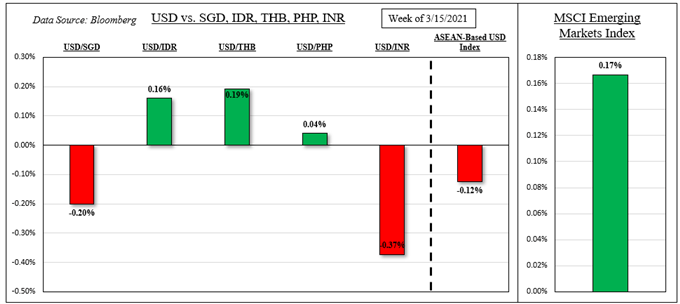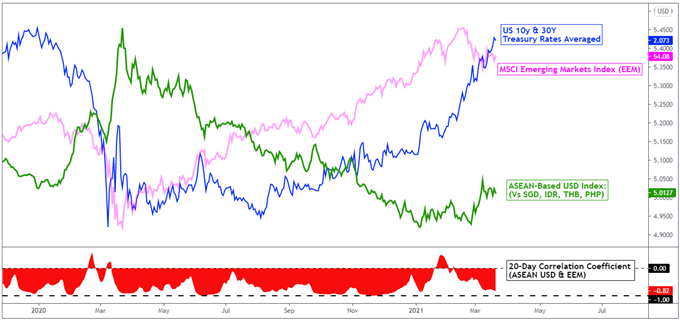US Dollar, Singapore Dollar, Thai Baht, Indonesian Rupiah, Indian Rupee, ASEAN, Fundamental Analysis – Talking Points
- US Dollar slightly rose against its ASEAN peers this past week
- Fed left door open to rising Treasury yields, eyes on core PCE
- USD/THB and USD/PHP are eyeing central bank rate decisions
Discover what kind of forex trader you are
US Dollar ASEAN Weekly Recap
The US Dollar experienced a relatively rosy week against some of its ASEAN counterparts, albeit gains were fairly modest. The Thai Baht and Indonesian Rupiah weakened 0.19% and 0.16% respectively while the Philippine Peso was fairly flat. Meanwhile, the Singapore Dollar outperformed, rising 0.2%. The MSCI Emerging Markets Index slightly higher, gaining 0.17%.
According to Bloomberg, global investors sold Thai stock for 7 days in a row as capital outflows dented the local currency. Meanwhile, the Bank of Indonesia left its benchmark 7-day repurchase rate unchanged at 3.5%. As anticipated, the central bank stepped up efforts to strengthen the Rupiah. Policymakers view IDR as undervalued, so losses could have been worse. More aggressive action could be seen if USD/IDR gains further.
US Dollar, MSCI Emerging Markets Index – Last Week’s Performance

*ASEAN-Based US Dollar Index averages USD/SGD, USD/IDR, USD/THB and USD/PHP
External Event Risk – Powell and Yellen Testimony, US Core PCE Data
All eyes were on the Federal Reserve last week amid rising longer-term Treasury yields. The central bank left benchmark lending rates and the pace of quantitative easing unchanged at $120 billion per month. There were upgrades to economic projections compared to December. But, despite this improvement, the central bank reiterated its dovish stance. Fed Chair Jerome Powell also remained sanguine about the bond market.
As such, the 10-year rate climbed to 1.72% last week, gaining 5.72% over the course of the week. With that in mind, continued reluctance from the Fed to take action amid rising inflation and growth prospects could see the reflation trade resume. This is fueling shifting portfolio allocations across the board, leaving equities that are perceived to be the most overvalued as the most vulnerable, such as tech stocks.
This also extends to certain areas of Emerging Markets. The MSCI Emerging Markets Index (EEM) is about 7% down from February’s peak. In comparison, the tech-heavy Nasdaq Composite is about 6.5% lower from last month’s peak. It should be noted that China’s central bank, the PBOC, has been gradually draining liquidity as it attempts to curb asset bubbles.
So with that in mind, ASEAN and Emerging Market currencies could remain vulnerable to the US Dollar in the near-term. The economic docket in the United States is fairly quiet in the week ahead. Eyes are on testimony from Fed Chair Jerome Powell and Treasury Secretary Janet Yellen before the Senate Banking Committee. Soft core PCE data, or the Fed’s preferred gauge of inflation, could also slow rising bond yields.


Recommended by Daniel Dubrovsky
How can you overcome common pitfalls in FX trading?
ASEAN, South Asia Event Risk – Bank of Thailand, Philippine Central Bank
Focusing on the ASEAN economic docket, USD/THB is eyeing the Bank of Thailand interest rate announcement on Wednesday. The central bank is expected to leave benchmark lending rates unchanged at 0.5%. The BOT may also welcome depreciation in its currency given that it often expresses concerns about a strong currency. Still, it may continue to leave the door open to further measures to curb THB’s strength.
Meanwhile, USD/PHP will be eyeing the Philippine Central Bank monetary policy announcement on Thursday. Here too the central bank is expected to leave interest rates unchanged at 2%. Governor Benjamin Diokno has hinted that recent upward price pressures are seen as transitory, pouring cold water on tightening bets. As such, the Philippine Peso may continue to focus on external sentiment developments.
Check out the DailyFX Economic Calendar for ASEAN and global data updates!
On March 19th, the 20-day rolling correlation coefficient between my ASEAN-based US Dollar index and the MSCI Emerging Markets index changed to -0.82 from -0.77 one week ago. Values closer to –1 indicate an increasingly inverse relationship, though it is important to recognize that correlation does not imply causation.
ASEAN-Based USD Index Versus EEM and Treasury Yields – Daily Chart

Chart Created Using TradingView
*ASEAN-Based US Dollar Index averages USD/SGD, USD/IDR, USD/THB and USD/PHP
— Written by Daniel Dubrovsky, Strategist for DailyFX.com
To contact Daniel, use the comments section below or @ddubrovskyFX on Twitter


Be the first to comment